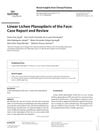5 citations,
July 2020 in “Recent patents on inflammation & allergy drug discovery” Childhood Alopecia Areata causes hair loss and requires varied treatments, with psychological support being crucial.
 October 2023 in “The Cochrane library”
October 2023 in “The Cochrane library” The medicine baricitinib was found to notably improve hair regrowth in alopecia areata, but more research is needed on its side effects and other treatments.
53 citations,
August 2014 in “Cochrane library” Methotrexate is not proven effective for inducing remission in ulcerative colitis.
1 citations,
January 2023 in “International journal of medical science and clinical research studies” Treating stubborn hair loss involves both medical and emotional support options.
286 citations,
August 2007 in “Journal of Clinical Investigation” Alopecia areata is an autoimmune disease where T cells attack hair follicles.
 4 citations,
June 2020 in “JAAD case reports”
4 citations,
June 2020 in “JAAD case reports” Permanent hair dye may cause total hair loss.
 105 citations,
December 2009 in “Archives of dermatology”
105 citations,
December 2009 in “Archives of dermatology” A specific drug can help treat Lichen Planopilaris, a condition causing permanent hair loss.
 66 citations,
January 2010 in “Journal of The American Academy of Dermatology”
66 citations,
January 2010 in “Journal of The American Academy of Dermatology” Mycophenolate mofetil was effective for most patients in treating scarring hair loss, but some had side effects.
 36 citations,
December 2015 in “Drugs”
36 citations,
December 2015 in “Drugs” New treatments for a chronic skin condition show promise, but individualized plans are crucial due to varying responses.
 3 citations,
July 2008 in “British journal of dermatology/British journal of dermatology, Supplement”
3 citations,
July 2008 in “British journal of dermatology/British journal of dermatology, Supplement” Terbinafine can cause hair loss.
 March 2024 in “Journal of pharmacopuncture”
March 2024 in “Journal of pharmacopuncture” Hominis Placenta Pharmacopunture helped regrow hair in a patient with stress-induced hair loss.
 April 2018 in “The journal of investigative dermatology/Journal of investigative dermatology”
April 2018 in “The journal of investigative dermatology/Journal of investigative dermatology” Samcyprone ointment is effective for treating common warts if a sensitization reaction occurs first.
 March 2014 in “Journal of The American Academy of Dermatology”
March 2014 in “Journal of The American Academy of Dermatology” Cortexolone 17a-propionate may be an effective new treatment for hair loss.
 101 citations,
November 1992 in “Archives of Dermatology”
101 citations,
November 1992 in “Archives of Dermatology” Steroids help hair regrowth, and minoxidil slows post-steroid hair loss, but effects are temporary.
 63 citations,
May 2000 in “Australasian Journal of Dermatology”
63 citations,
May 2000 in “Australasian Journal of Dermatology” Chemotherapy and bone marrow transplant can cause permanent hair loss.
 20 citations,
March 2006 in “Seminars in Cutaneous Medicine and Surgery”
20 citations,
March 2006 in “Seminars in Cutaneous Medicine and Surgery” Minoxidil and finasteride can help with hair loss, but more research is needed to improve treatments for certain types of hair loss.
 16 citations,
May 2011 in “Dermatologic therapy”
16 citations,
May 2011 in “Dermatologic therapy” Effective treatments for severe alopecia areata are still lacking.
 8 citations,
January 1989 in “Annual Reports in Medicinal Chemistry”
8 citations,
January 1989 in “Annual Reports in Medicinal Chemistry” Hair loss from alopecia areata and androgenetic alopecia can be treated, but more effective and safer treatments are needed.
 5 citations,
January 2016 in “Skin appendage disorders”
5 citations,
January 2016 in “Skin appendage disorders” A rare skin condition called linear lichen planopilaris caused itchy red bumps and hair loss on a man's face.
 3 citations,
January 2000
3 citations,
January 2000 Some alternative therapies for vitiligo show promise but need more research.
 October 2023 in “Dermatology practical & conceptual”
October 2023 in “Dermatology practical & conceptual” Pulse corticosteroids help regrow hair in alopecia areata but have side effects, especially betamethasone.
 January 2020 in “Der Pharmacia Lettre”
January 2020 in “Der Pharmacia Lettre” Nanoparticle-based herbal remedies could be promising for treating hair loss with fewer side effects and lower cost, but more research is needed.
 July 2018 in “Elsevier eBooks”
July 2018 in “Elsevier eBooks” Up to half of people experience itchy scalp, often due to skin conditions like seborrheic dermatitis or psoriasis, and treatments vary based on the specific cause.
 290 citations,
December 2017 in “Journal of The American Academy of Dermatology”
290 citations,
December 2017 in “Journal of The American Academy of Dermatology” Alopecia areata is an autoimmune condition causing hair loss, influenced by genetics, stress, and diet, and may be prevented by a high soy oil diet.
 160 citations,
March 2009 in “Seminars in Cutaneous Medicine and Surgery”
160 citations,
March 2009 in “Seminars in Cutaneous Medicine and Surgery” New insights show Lichen Planopilaris is a rare, scarring hair loss condition, hard to treat, mainly affecting middle-aged women, and significantly impacts mental health.
 103 citations,
January 2009 in “Carbon”
103 citations,
January 2009 in “Carbon” Pure carbon nanotubes are safe for mice, but impure ones cause immune issues and hair loss.
 85 citations,
October 2012 in “Dermatologic Clinics”
85 citations,
October 2012 in “Dermatologic Clinics” Alopecia Areata is an autoimmune condition often starting before age 20, with varied treatment success and a need for personalized treatment plans.
 76 citations,
June 2008 in “Journal of the American Academy of Dermatology”
76 citations,
June 2008 in “Journal of the American Academy of Dermatology” The conclusion is that certain scalp tissue changes are characteristic of lichen planopilaris, with mucinous perifollicular fibroplasia being a new feature for diagnosis.
 71 citations,
March 2009 in “Seminars in cutaneous medicine and surgery”
71 citations,
March 2009 in “Seminars in cutaneous medicine and surgery” Alopecia areata can cause unpredictable hair loss, and treatments like corticosteroids and minoxidil may help but have varying side effects.
 61 citations,
January 2015 in “Indian Journal of Plastic Surgery”
61 citations,
January 2015 in “Indian Journal of Plastic Surgery” Platelet-rich plasma treatment could potentially be an effective way to treat chronic alopecia areata with minimal side effects.

























